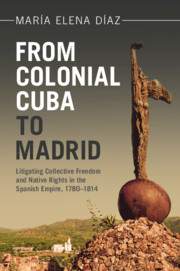 From Colonial Cuba to Madrid
From Colonial Cuba to Madrid Published online by Cambridge University Press: 14 November 2024
The cobreros entered the Age of Revolutions in 1780 in a calamitous position but emerged in 1800 in a stronger one with an edict recognizing their freedom and their pueblo. Although they retained their formal civil freedom, the limited political freedoms they obtained were eroded during the first decades of the nineteenth century given wider colonial and global changes. Yet the cobreros continued using the courts invoking the Freedom Edict of 1800, but how the local identity of natives of El Cobre continued to be mobilized or how it changed in subsequent generations with the arrival of other settlers and the globalization of El Cobre remains uncertain. After summarizing the main findings and arguments of the study, the book concludes with a reflection on the significance of the category of local nativeness for racial colonial subjects and the political uses and rights claimed for this category in changing historical contexts in the past and its reemergence in various Latin American nations in the twenty-first century.
To save this book to your Kindle, first ensure [email protected] is added to your Approved Personal Document E-mail List under your Personal Document Settings on the Manage Your Content and Devices page of your Amazon account. Then enter the ‘name’ part of your Kindle email address below. Find out more about saving to your Kindle.
Note you can select to save to either the @free.kindle.com or @kindle.com variations. ‘@free.kindle.com’ emails are free but can only be saved to your device when it is connected to wi-fi. ‘@kindle.com’ emails can be delivered even when you are not connected to wi-fi, but note that service fees apply.
Find out more about the Kindle Personal Document Service.
To save content items to your account, please confirm that you agree to abide by our usage policies. If this is the first time you use this feature, you will be asked to authorise Cambridge Core to connect with your account. Find out more about saving content to Dropbox.
To save content items to your account, please confirm that you agree to abide by our usage policies. If this is the first time you use this feature, you will be asked to authorise Cambridge Core to connect with your account. Find out more about saving content to Google Drive.